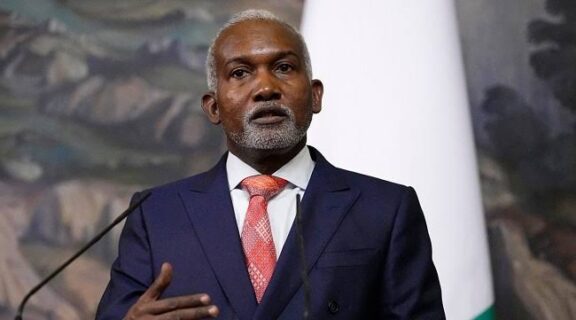……Embassy staff unpaid, debts pile up as Tinubu govt sets up committee to review arrears
BY TEDDY NWANUNOBI & TONY UDOKA
The Federal Government has finally confirmed what the New National Star exclusively reported on August 24, 2025, that Nigeria’s embassies and consulates abroad are in deep financial crisis, battling unpaid staff salaries, rent arrears, and mounting debts to service providers.
In a statement issued Monday, the Ministry of Foreign Affairs admitted that several missions are facing severe funding shortfalls that have crippled their ability to operate effectively.
Ministry of Foreign Affairs Spokesman, Kimiebi Ebienfa acknowledged that the cash crunch has left embassies struggling to meet basic obligations, including paying locally recruited staff, landlords, and service contractors.
“The ministry is not unaware of the restrictions that financial limitations have placed on the smooth running of the missions, including the inability to pay salaries of locally recruited staff, financial obligations to service providers, rent to landlords, and the foreign service allowance to home-based officers,” Ebienfa said.
This rare admission by the federal government comes just days after New National Star’s exclusive exposé that foreign embassy staff have gone without pay since September 2024 and that Nigerian missions worldwide were scaling down operations, delaying rent payments, and surviving on loans and goodwill.
When our paper first broke the story, insiders described a diplomatic service “adrift,” with staff demoralised and embassies unable to meet even basic needs.
At the time, the Ministry downplayed the crisis, with Ebienfa insisting unpaid wages were “not uniform.” But six months on, the government is conceding what staff and observers had long warned, that missions are underfunded, overstretched, and their credibility abroad is eroding.
The crisis is worsened by President Bola Tinubu’s decision in July 2023 to recall 109 ambassadors worldwide without appointing replacements. That vacuum, as New National Star reported, has left embassies without leadership capable of pressing Abuja for funding or navigating host-country negotiations.
Deputy heads of mission and chargés d’affaires, though competent, lack the authority and recognition of ambassadors. The result has been bureaucratic gridlock, budget approvals delayed, disbursements stalled, and staff left unpaid for several months.
Opposition parties have seized on the lapse, with the African Democratic Congress (ADC) recently describing the ambassadorial vacuum as “the longest in Nigeria’s history,” warning that the absence of envoys has robbed Nigeria of influence in global decision-making.
“Since President Bola Ahmed Tinubu recalled Nigeria’s 109 ambassadors in 2023, none has been replaced, leaving our country no voice or representation when decisions are taken that affect our country and our citizens,” the ADC said.
The human impact is stark. In Europe and North America, embassy staff privately admit to sources that they cannot cover children’s school fees or medical expenses.
Across missions, delays in passport renewals and sluggish consular assistance are now commonplace, frustrating Nigerians abroad who depend on these services.
In its statement, the Ministry of Foreign Affairs traced the crisis to years of budgetary limitations compounded by Nigeria’s broader economic woes.
“It is pertinent to state that the Nigerian diplomatic missions are not immune to the economic situation at home and its attendant challenges to government operations,” the ministry noted.
Ebienfa said the Tinubu administration has approved “special intervention funds” to cushion the hardship faced by missions and set up a committee to verify their debt profiles. He claimed more than 80 percent of available funds have now been cleared for payments, with priority given to service providers, local staff salaries, and arrears owed to officers.
The ministry added that it has engaged the Accountant-General’s office to secure refunds for foreign exchange shortfalls in the 2024 budget cycle.
“Tinubu, GCFR, has graciously approved the settlement of the shortfall. Consequently, the first tranche has already been remitted to all Missions, with some having confirmed receipt.
“Similarly, the Second Semester Allocations have also been approved. The Ministry is engaging with the Federal Ministry of Finance and the Central Bank of Nigeria to facilitate the prompt release of Personnel and Overhead Cost Allocations to all Missions, starting this week, to clear outstanding Allowances and further alleviate the financial situation of the Missions. With these efforts, Missions have begun to stabilise.
“In the same vein, the Ministry is also working diligently to develop a sustainable financial model for funding our missions abroad, which includes exploring innovative solutions and efficiency measures to ensure long-term operational stability. These efforts are integral to the broader public sector financial reforms being implemented by the Federal Government, aimed at enhancing fiscal governance and ensuring the effective allocation of resources.
“The Ministry recognises the resilience and dedication of its diplomatic staff who continue to discharge their duties with commendable patriotism under these difficult circumstances. We also thank the host governments, service providers and our international partners for their understanding and continued cooperation. The Nigerian government remains unwavering in its commitment to providing the necessary support to all its Missions abroad with a view to enabling them to function at their full capacity.
“We are confident that the current challenges are temporary and will be overcome through the concerted efforts of this administration.
“The Ministry of Foreign Affairs reaffirms Nigeria’s commitment to robust and dynamic international diplomacy, as well as the unwavering protection and welfare of every Nigerian citizen worldwide, the statement said.
But critics argue that the government’s assurances fall short. Transparency International and other civil society groups say the crisis is symptomatic of weak governance and misplaced priorities, especially given the N54.99 trillion 2025 budget signed into law in February this year.
The ADC has gone further to link the current crisis to the recent visa disputes with the United States and the UAE, accusing the Tinubu administration of “leaving Nigeria voiceless in critical global negotiations.”

